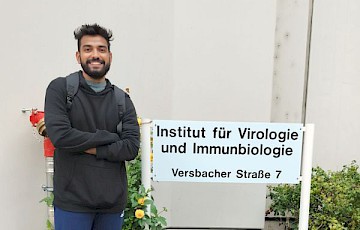22 July 2021
DBT-Wellcome Trust India Alliance Grant to Ahmedabad University Researcher for saliva-based test for detecting oral cancer.

AHMEDABAD: In what is yet another feather on the cap of Ahmedabad University’s reputation as a research-based institution, Dr. Shanaya Patel-Bakeri, a research scholar at the School of Arts and Sciences, has been selected for the prestigious DBT-Wellcome Trust India Alliance Early Career Fellowship for her proposal on developing a non-invasive saliva-based test for detecting oral cancer.
Shanaya is among only 10 candidates in India who have been selected this year for the fellowship that is granted by the DBT-Wellcome Trust India Alliance, an independent, dynamic public charity that funds research in health and biomedical sciences in India. She will work under the supervision of Vivek Tanavde, Associate Professor of Biological and Life Sciences at the School of Arts and Sciences. Professor Balachandran Ravindran, who has been with the Biological and Life Sciences division at Ahmedabad University as an Adjunct Professor, is the mentor for this project.
Shanaya’s work assumes importance given that India has the highest number of cases of oral cancer because of the people’s habit of chewing tobacco. As she puts it, “it is our problem”. Head and neck cancers (HNC), under which oral cancer falls, continues to be one of the unresolved problems of the Indian subcontinent with a whopping 1,35,000 new cases registered annually. This is because of excess consumption of chewing tobacco, gutka and khaini by the people. Despite the recent advances and developments in treatments, there is a disappointingly low five-year survival rate of these patients. One of the major reasons for this is late-stage diagnosis with only 14 per cent of the cases coming to the clinic at premalignant or stage 1 of cancer.
Invasive biopsies are required to diagnose these cancers. In her proposal for the Fellowship, Shanaya highlighted that it is imperative to develop disease-specific non-invasive tests for early diagnosis.
“Plasma cell-free DNA (cfDNA) has emerged as a promising non-invasive technology for early detection of cancer,” she stated in her proposal. “The approach is not dependent on tumour biopsies. This study aims to identify cfDNA fragmentation patterns from saliva and plasma of oral cancer patients and investigate whether these fragments can be used for early detection. This approach may also enable early risk prediction of head and neck cancers.”
There is no marker for early detection of oral cancer like those available for prostate cancer and breast cancer. “Now, we have identified a few biomarkers,” Shanaya, who has been working on oral cancer since 2011, said. “But still there is no early marker. The need of the hour is to have a marker to detect this cancer early.”
Pointing out that these malignancies are very painful and the biopsies traumatising for patients, she said: “So, now we can use saliva. The question is: can we use saliva for early detection of oral cancer?”
This project will be carried out in collaboration with Dr Kaustubh Patel of HCG Comprehensive Cancer Hospital, Ahmedabad, and Dr Mariana Brait of the Sidney Kimmel Comprehensive Cancer Center at Johns Hopkins University, Baltimore, US. Shanaya explained that John Hopkins University’s School of Medicine is also looking for a solution for early diagnosis of head and neck cancers and has pioneered the use of cfDNA technology in cancer diagnosis.
Shanaya did her PhD on oral cancer from Gujarat Cancer and Research Institute. Following this, she joined Ahmedabad University in 2018 as a national post-doctoral fellow funded by the Science and Engineering Research Board under the Department of Science and Technology, Government of India. She opted to do her research work under the guidance of Professor Tanavde, whose research interests include, among others, cancer biomarkers.
To read the article, please click here.
To read the article in Gujarati, please click here.



